I’m currently reading The Brothers Grimm’s Fairy Tales (Grimms Märchen) so Jacob and Wilhelm Grimm seemed like a logical choice to launch a new series of posts on andBerlin – Famous Berliners.
In this series I hope to present some of the characters whose histories have become entwined with the history of the city itself – men and women who have shaped the political, literary or musical development of Berlin or in some way altered the lives of its citizens.
Many of these people, like myself, will not be born and bred Berliners, some may have spent only a little time here but all will have left their mark.
The Graves of the Brothers Grimm
Jacob and Wilhelm Grimm only spent the years from 1840 until their deaths in 1859 and 1863 in Berlin, working at the University but their bodies are buried at the Alter St-Matthäus-Kirchhof in Schöneberg.
Grimm’s Fairy Tales
Grimm’s Fairy Tales have been thrilling and frightening children in equal measure since they were first published as a collection of Children’s and Household Tales in 1812.
Their book was the first time that many of these folklores, that up to that point had been passed down orally from generation to generation, had appeared in print and was therefore responsible for introducing the tales to the wider world. Amongst the most popular stories they brought us are Cinderella (Ashputtel); Snow White (Snow Drop); Sleeping Beauty (Rose-bud); Rumpelstiltskin; and Rapunzel.
Other Literary Work
Whilst they are best known for their fairy tales the Brothers Grimm were academics and their collection of folk stories grew out of their work in Philology, the study of languages, particularly in relation to historical texts.
After the publication of their most well known work the Grimms continued their studies of the German language and Jacob Grimm is credited with Grimm’s Law a set of statements that describe the development of Proto-Germanic from Proto-Indo-European languages.
The Brothers also began work on a German dictionary, which remained unfinished at their deaths.
Jacob-und-Wilhelm-Grimm-Zentrum
Jacob-und-Wilhelm-Grimm-Zentrum (Jacob and Wilhelm Grimm Centre) opened in Berlin in 2009 and houses the Central Library of the Humboldt University. The building is located on Geschwister-Scholl-Strasse and visible from the S-Bahn as it travels between Friedrichstrasse and Hackescher Markt.


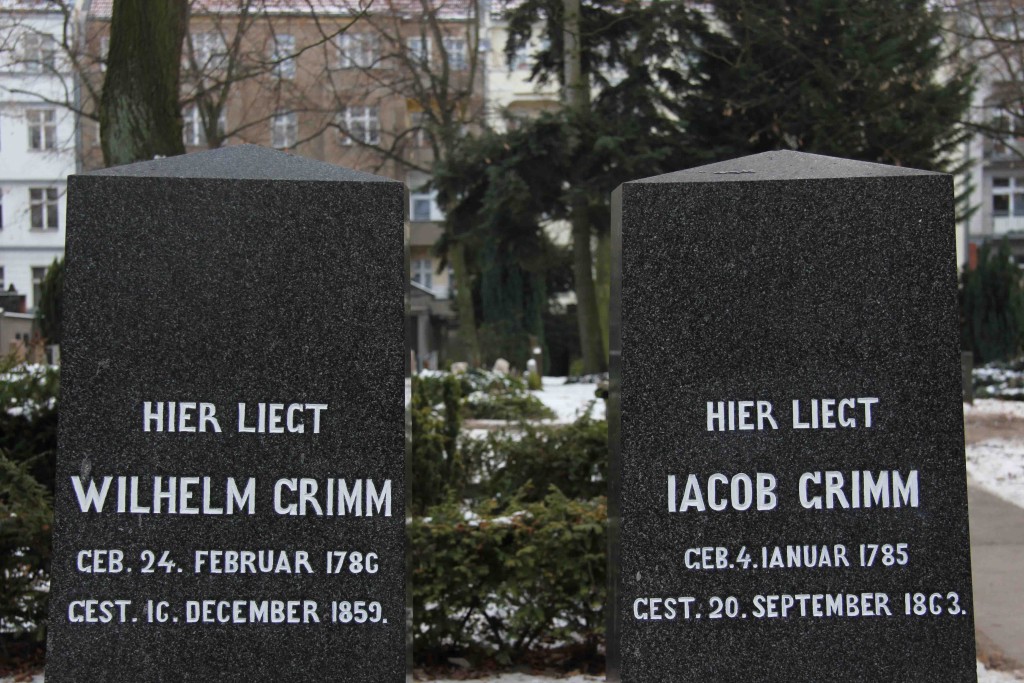
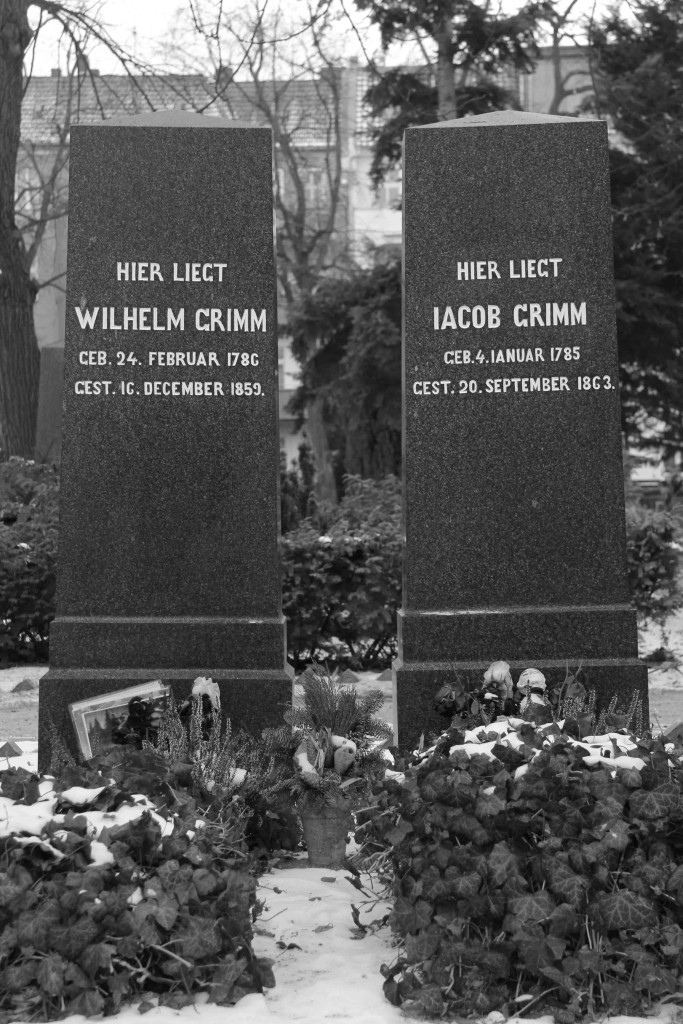
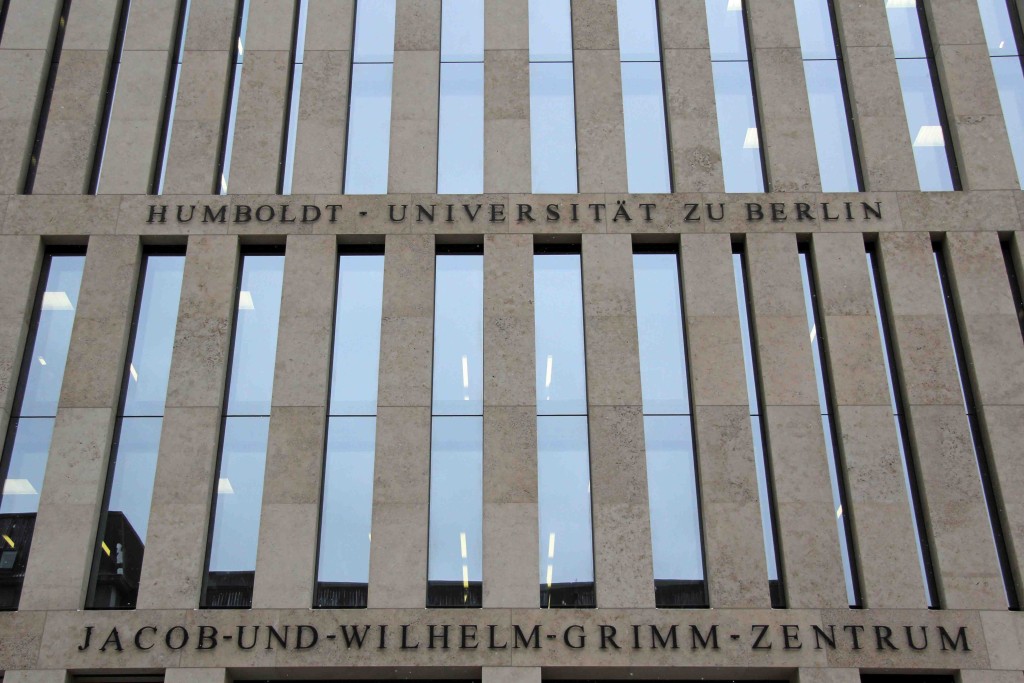
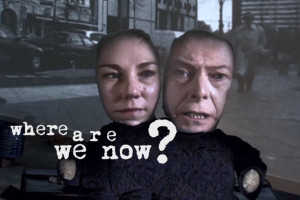

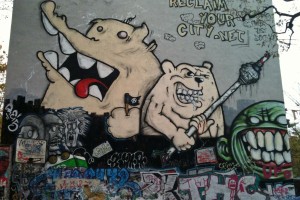
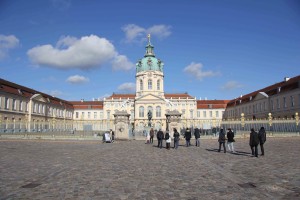
I know exactly where that is. Behind the graves you see Monumentenstrasse. On the same cemetery, just before you walk up to the Grimm graves there are the men, including Graf vomStaufenberg, who were executed by the Nazis on the 20. July 1944.
What a coincidence – I have been watching documentaries and reading up on Operation Valkyrie recently and was at the German Resistance Memorial Centre yesterday. I’ll have to go back to the Kirchhof to see the memorial there. Thanks for letting me know about it.
It is not so much a memorial as that the graves of the executed are grouped together. When I went there, years ago, there was informations available at the entrance to the cemetery at Großgörschenstraße..
My understanding is that the bodies of the executed men were exhumed and burned by the Nazis and the ashes sprinkled elsewhere so I wasn’t sure you could call them graves any more.
Yes that is what they say. Perhaps it is only a memorial and I mistook them for graves. Here is an entry about the cometary: http://de.wikipedia.org/wiki/Alter_St.-Matth%C3%A4us-Kirchhof_Berlin#Ehrengr.C3.A4ber
It is only available in German but you find a picture of the memorial there. Many famous people are buried there and the cemetary would have been a victim of Germania too.
I would like to go there sometime…..I have always loves the brothers Grimm.
My mother claims as a little girl living in Berlin her and her sister stumbled across the unkept graves of the brothers Grimm. This would have been a short time after the fall of Berlin. Was this burial site noted for being in disrepair or overlooked as a landmark for the brothers at some point?
Scott, I have found several mentions of graves being removed and/or damaged. First, the graves were removed from the northern third in 1938/39 to make way for the North-South Axis of the planned Welthauptstadt Germania. Then, during the war further graves were damaged by bombs and fighting during World War II. It seems to me therefore entirely possible that the Grimms’ graves were in the state your mother remembers. (Source: http://www.berlin.de/sehenswuerdigkeiten/3560819-3558930-alter-st-matthaeus-kirchhof.html#)
Thank you; for the information.